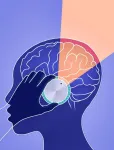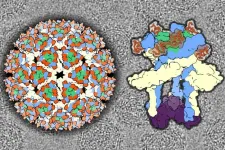(Press-News.org) Mount Sinai researchers have shown for the first time that a person’s beliefs related to drugs can influence their own brain activity and behavioral responses in a way comparable to the dose-dependent effects of pharmacology.
The implications of the study, which directly focused on beliefs about nicotine, are profound. They range from elucidating how the neural mechanisms underlying beliefs may play a key role in addiction, to optimizing pharmacological and nonpharmacological treatments by leveraging the power of human beliefs. The study was published in the journal Nature Mental Health.
“Beliefs can have a powerful influence on our behavior, yet their effects are considered imprecise and rarely examined by quantitative neuroscience methods,” says Xiaosi Gu, PhD, Associate Professor of Psychiatry, and Neuroscience, at the Icahn School of Medicine at Mount Sinai, and senior author of the study. “We set out to investigate if human beliefs can modulate brain activities in a dose-dependent manner similar to what drugs do, and found a high level of precision in how beliefs can influence the human brain. This finding could be crucial for advancing our knowledge about the role of beliefs in addiction as well as a broad range of disorders and their treatments.”
To explore this dynamic, the Mount Sinai team, led by Ofer Perl, PhD, a postdoctoral fellow in Dr. Gu’s lab when the study was conducted, instructed nicotine-dependent study participants to believe that an electronic cigarette they were about to vape contained either low, medium, or high strengths of nicotine, when in fact the level remained constant. Participants then underwent functional neuroimaging (fMRI) while performing a decision-making task known to engage neural circuits activated by nicotine.
The scientists found that the thalamus, an important binding site for nicotine in the brain, showed a dose-dependent response to the subject’s beliefs about nicotine strength, providing compelling evidence to support the relationship between subjective beliefs and biological substrates in the human brain. This effect was previously thought to apply only to pharmacologic agents. A similar dose-dependent effect of beliefs was also found in the functional connectivity between the thalamus and the ventromedial prefrontal cortex, a brain region that is considered important for decision-making and belief states.
“Our findings provide a mechanistic explanation for the well-known variations in individual responses to drugs,” notes Dr. Gu, “and suggest that subjective beliefs could be a direct target for the treatment of substance use disorders. They could also advance our understanding of how cognitive interventions, such as psychotherapy, work at the neurobiological level in general for a wide range of psychiatric conditions beyond addiction.”
Dr. Gu, who is one of the world’s foremost researchers in the emerging field of computational psychiatry, cites another way in which her team’s research could inform clinical care. “The finding that human beliefs about drugs play such a pivotal role suggests that we could potentially enhance patients’ responses to pharmacological treatments by leveraging these beliefs,” she explains.
Significantly, the work of the Mount Sinai team can also be viewed in a much broader context: harnessing beliefs in a systematic manner to better serve mental health treatment and research in general.
“We’re interested in testing the effects of beliefs on drugs beyond nicotine to include addictive substances like cannabis and alcohol, and therapeutic agents like antidepressants and psychedelics,” says Dr. Gu. “It would be fascinating to examine, for example, how the potency of a drug might impact the effect of drug-related beliefs on the brain and behavior, and how long-lasting the impact of those beliefs might be. Our findings could potentially revolutionize how we view drugs and therapy in a much broader context of health.”
About the Mount Sinai Health System
Mount Sinai Health System is one of the largest academic medical systems in the New York metro area, with more than 43,000 employees working across eight hospitals, more than 400 outpatient practices, more than 300 labs, a school of nursing, and a leading school of medicine and graduate education. Mount Sinai advances health for all people, everywhere, by taking on the most complex health care challenges of our time—discovering and applying new scientific learning and knowledge; developing safer, more effective treatments; educating the next generation of medical leaders and innovators; and supporting local communities by delivering high-quality care to all who need it. Through the integration of its hospitals, labs, and schools, Mount Sinai offers comprehensive health care solutions from birth through geriatrics, leveraging innovative approaches such as artificial intelligence and informatics while keeping patients’ medical and emotional needs at the center of all treatment. The Health System includes approximately 7,400 primary and specialty care physicians; 13 joint-venture outpatient surgery centers throughout the five boroughs of New York City, Westchester, Long Island, and Florida; and more than 30 affiliated community health centers. Hospitals within the System are consistently ranked by Newsweek’s® “The World’s Best Smart Hospitals, Best in State Hospitals, World Best Hospitals and Best Specialty Hospitals” and by U.S. News & World Report's® “Best Hospitals” and “Best Children’s Hospitals.” The Mount Sinai Hospital is on the U.S. News & World Report® “Best Hospitals” Honor Roll for 2023-2024.
###
END
Ear infections are a common childhood experience, but a new study suggests parents should take these infections seriously to preserve their children’s language development. That’s because each ear infection can potentially impair hearing with fluid building up behind the eardrum.
New research from University of Florida scientists reveals that when ear infections become chronic, this repeated, temporary hearing loss can lead to deficits in auditory processing and language development in children years later.
“Ear ...
About The Study: In this study of more than 1.3 million inpatient admissions for treatment of COVID-19 from March 2020 through March 2022, researchers estimated an average national medical resource use or hospital cost to deliver care per COVID-19 inpatient stay at $11,275. Hospital costs increased more than five times the rate of medical inflation over this period. This was explained partly by changes in the use of extracorporeal membrane oxygenation, which also increased over time. Nonetheless, costs to provide inpatient care increased even as care practices changed, vaccination rates increased, and the variants of concern evolved.
Authors: Kandice A. ...
About The Study: This study that included 525 Black adolescents found an association between individual online racial discrimination and posttraumatic stress disorder symptoms and between posttraumatic stress disorder symptoms and suicidal ideation. These risk factors are important to consider in continuing studies of the cause of suicidal ideation for Black adolescents in the U.S.
Authors: Brendesha M. Tynes, Ph.D., of the University of Southern California, Los Angeles, is the corresponding author.
To ...
The average cost of providing care to hospitalized COVID-19 patients increased five times faster than the rate of medical inflation during the first two years of the pandemic, at least partly because of the application of additional medical technologies over the period, according to a new RAND Corporation study.
Examining patients treated at academic medical centers across the nation, researchers found that the average cost of treatment for COVID-19 infection increased from $10,094 during the first weeks of the pandemic to $13,072 during March 2022.
Significant ...
New Haven, Conn. — Yale researchers have identified a drug target that may alleviate joint degeneration associated with osteoarthritis, a debilitating condition that afflicts as many as 30 million people in the United States alone, which they report on Jan. 3 in the journal Nature.
Pain relievers and lifestyle changes, such as exercise and reduced excess weight, have long been the therapies most commonly used to treat the joint stiffness and pain caused by degenerative disease, but there ...
Researchers at the Georgia Institute of Technology have created the world’s first functional semiconductor made from graphene, a single sheet of carbon atoms held together by the strongest bonds known. Semiconductors, which are materials that conduct electricity under specific conditions, are foundational components of electronic devices. The team’s breakthrough throws open the door to a new way of doing electronics.
Their discovery comes at a time when silicon, the material from which ...
An atomic-level investigation of how Eastern equine encephalitis virus binds to a key receptor and gets inside of cells also has enabled the discovery of a decoy molecule that protects against the potentially deadly brain infection, in mice.
The study, from researchers at Washington University School of Medicine in St. Louis, is published Jan. 3 in the journal Cell. By advancing understanding of the complex molecular interactions between viral proteins and their receptors on animal cells, the findings lay a foundation for treatments and vaccines ...
New study sheds light on the previously overlooked Mongolian Arc—a monumental wall system in eastern Mongolia spanning 405 kilometers. This discovery not only reveals the significance of this ancient architectural marvel but also prompts crucial questions about the motives, functionality, and broader implications of such colossal constructions. Their findings contribute to a larger multidisciplinary project exploring historical wall systems and their socio-political, economic, and environmental impacts, marking a pivotal milestone in understanding ancient civilizations and their enduring legacies.
[Jerusalem, ...
The General Assembly 2024 of the European Geosciences Union (EGU) will be held at the Austria Center Vienna (ACV) in Vienna, Austria and online, from 14–19 April 2024. eLTER will organise the following session:
BG8.14: Integrated solutions for landscape management of GHG balance and biodiversity in a changing environment
Convener: Syed Ashraful Alam, Katri Rankinen, Thomas Dirnböck, Harry Vereecken, Olga Vindušková
The session is co-sponsored by eLTER.
The abstract submission deadline is Wednesday, 10 January 2024, 13:00 CET.
Society is placing increasing and potentially competing demands on our environment. ...
As cities grow bigger and faster, water pollution is becoming a serious problem. We need good ways to clean the water. Traditional cleaning methods, Persulfate (PS)- Advanced Oxidation Processes (AOPs), are good at treating the bad stuff in the water, but they require a lot of energy and chemicals, like special light and metals ions. This is costly and environmentally harmful. It's urgent to find better and more eco-friendly ways to clean it.
In a recent study published in Volume 18 of the journal Environmental Science and Ecotechnology, scientists ...






